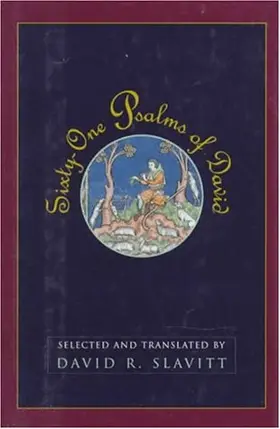

Sixty-One Psalms of David
That power and artistry are made magnificently apparent in Sixty-One Psalms of David. This is not so much another translation as an inspired and engagingly fresh rendition of the Psalms. Following the tradition of Ezra Pound's versions and Robert Lowell's Imitations, David R. Slavitt--himself an esteemed poet and translator of Ovid, Virgil, Seneca, and others--casts the Psalms into a modern idiom that stays faithful to the original but strikes the ear remarkably like contemporary speech. Perhaps the most innovative and immediately appealing feature of these renditions is Slavitt's skillful use of traditional poetic forms. Here the Psalms are compressed, clarified, and given the satisfying shapes and textures of English poetry. Working most often in rhymed tetrameter quatrains, but also employing rhymed couplets and other forms, Slavitt brings all the subtlety and expressive power of English versification to these Psalms, and the result is a poetry that fits comfortably in the lineage that includes John Donne, William Blake, and Richard Wilbur. Metrically supple, vividly physical, and marked by felicitous phrasing throughout, these renditions preserve the spiritual directness of the originals while giving readers the added pleasures of a new, and seemingly effortless, formal variety. As poet and Jewish folklorist Howard Schwartz has observed on this collection, in Slavitt's hands the Psalms become an intense, one-sided conversation with God. They cohere in the only way a fine book of poems can, unified by the poets voice. The full range of emotion emerges, especially fear, disgust at the foibles of humanity, loathing of one's enemies, and awe and trust in God.
Readers well familiar with the Psalms will want to have Slavitt's new renditions alongside the Bible on their shelves, as a highly inventive and illuminating counterpoint. And readers coming upon these verses for the first time will feel themselves blessed to discover poetry and prayer so beautifully joined.